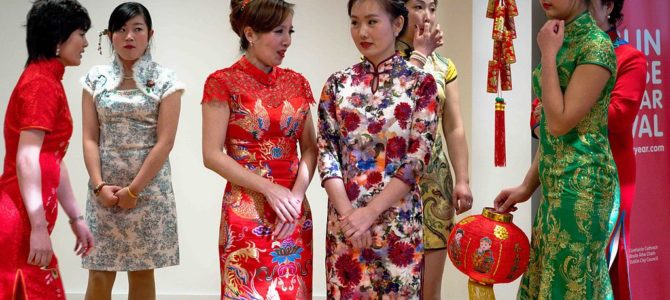Chinese manufacturers are shipping thousands of fake iPhones to more than 30 fake Apple stores in the city of Shenzhen alone. These phones are designed to look just like the Apple original, capitalizing on the American brand to sell look-a-likes to the emerging Chinese middle-class.
The market for fake iPhones had once been so strong that in 2009 it comprised 20 percent of all Chinese smartphones. The Chinese government has been perfectly content to let their factories appropriate and imitate our technology until it no longer becomes useful to them. For example, just as China apologizes for letting its companies run amok with Apple brands and technology, its factories are now being accused of stealing our wind turbine trade secrets. It’s almost as if they know we’re in on the joke.
I write this because of a debate stirred over many corners and fathoms of the Internet about a Utah girl who wore a “traditional” Chinese dress called a Qipao. The Qipao is actually a Western-Chinese hybrid dress, which, of course, only adds to the absurdity of the fact that even though the Chinese first appropriated Western fashion to design this dress, it is now being attacked as Western cultural appropriation of Chinese fashion. How dare a Westerner attempt to wear a cultural garment that the Chinese stylized from the West! And, as it turns out, dresses aren’t the only thing the Chinese have “stylized” from the West.
For one, Chinese hackers, rippers, and burners have been taking our digital cultural products almost 20 years running. In 2011, illegally pirating Hollywood movies raked in $6 billion for the Chinese economy. By comparison, China generates close to $1.5 billion in box-office receipts every year. A 2012 report pegged illegal music downloads as comprising 99 percent of total music downloads in China.
Talk about exploiting other people’s cultural products for “consumerism,” as one Twitter personality described the use of the Qipao prom dress. We love to look upon China as a pristine land of straw umbrella-hats and cute rice paddies. The reality is that China is voracious, shameless, and extremely skilled at turning our cultural exports into their profit — and then acting like they don’t know any better.
But Chinese appropriation of American property goes far beyond mild economic mischief into putting our companies at a serious competitive disadvantage. A scathing 2018 New York Times report notes that China will “Beg, Borrow, or Steal” their way into U.S. trade secrets, happily taking whatever we are too clumsy to watch carefully. This includes extorting American electric car companies to give up control of their technology in exchange for permits to sell to Chinese residents. This also includes pressuring U.S. technology companies to give up sensitive operations research for the Chinese government to “review.”
Altogether, theft of trade secrets directly accounts for between $150-500 billion in lost U.S. revenue per year, and that doesn’t even include the indirect revenue lost by training up future domestic competitors to crowd out U.S. businesses operating in China. To return to the phone example, China now boasts a domestic smartphone market that captures over 70 percent of Chinese consumers, up from zero ten years ago. These “homegrown” smartphone makers now produce phones in the same factories that Apple and Samsung used to make their wares. It appears likely that these domestic brands got a major leg up from their former tenants – probably without their permission.
What is truly worrying, however, is how China has let loose its copycat animals upon the most sacred of our technology — defense. Like prey who would prefer to be duped into capture, we let the Chinese make 5,000 visits to U.S. laboratories per year, according to the Institute of World Politics. These visits can be had for a duration of up to 2 years, and they include tours of high-security premises and sensitive defense technologies. And China is hardly putting on the brakes.
A comprehensive new cybersecurity law passed by the ruling Communist Party allows the government to conduct unannounced security reviews of any technology companies operating in China that “could affect national security.” China’s reported completion of the J-20, one of the world’s most technologically advanced stealth fighter jets, was bolstered heavily in part by industrial espionage on U.S. soil. No, this isn’t just about Levi’s Jeans and prom dresses anymore. This is about the appropriation of U.S. goods and services on a grand, even possibly a nation-threatening scale.
When we talk about cultural appropriation, we often fail to realize how little other people across the world care about it. To rapidly globalizing powers like China, it is practically a national sport to copy our products, with corporate horse-races to see who can imitate our latest innovations first. The fact that we can even get outraged over one girl’s prom dress is a product of our privileged position within the world’s cultural and technological hierarchies — one that we risk surrendering, if we don’t get serious about who’s really doing the appropriating in this relationship.









